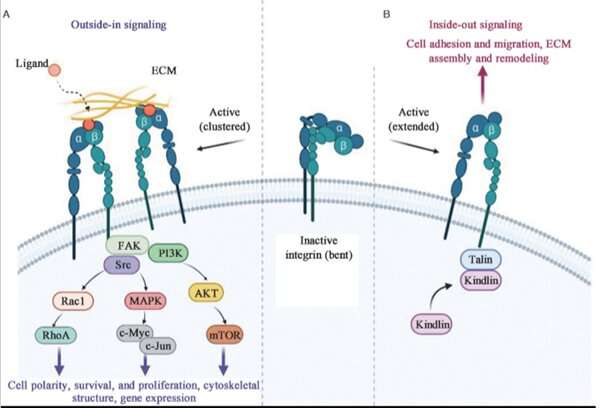This article has been reviewed according to Science X's editorial process and policies. Editors have highlighted the following attributes while ensuring the content's credibility:
fact-checked
proofread
Researchers review the role of integrins in human hepatocellular carcinoma

Globally, human hepatocellular carcinoma (HCC) is the sixth most common cancer and the fourth leading cause of cancer-related mortality. The worldwide incidences of HCC have been on the rise in recent decades. Unfortunately, most patients diagnosed with the advanced form of HCC have a very low long-term survival rate. Moreover, HCC often develops resistance to conventional chemotherapy. It is therefore imperative to target new biomolecules that regulate HCC growth.
In this regard, a review article jointly published in Chinese Medical Journal by researchers from the United States and China, highlights the physiological significance of integrins—a class of proteins modulating key pathological processes such as tumor growth, invasion, angiogenesis, metastasis, and therapeutic resistance.
Integrins mediate key biological processes such as cell adhesion, migration, signal transduction, and gene transcription. Integrin levels are usually aberrant in patients with HCC. Moreover, various integrins interact with physiologically relevant biomolecules including growth factors and signaling proteins to promote cancer growth and metastasis. Targeting integrins can therefore pave the way for the development of novel anti-cancer therapeutics.
Says senior author Deyu Fang from Northwestern University Feinberg School of Medicine, "In this review, we summarize the recent reports of integrins in HCC, focusing on their abnormal expression, activation, and signaling of integrins in cancer cells as well as their roles in other cells in the tumor microenvironment. We also discuss the regulation and functions of integrins in hepatitis B virus (HBV)-related HCC. Finally, we discuss the current status and therapeutic strategies of anti-integrin drugs in preclinical and clinical practice to combat life-threatening liver cancer."
Recent studies demonstrate that integrins exist in at least three different three-dimensional configurations, each of which has a unique role to play in various cellular processes. For instance, when integrins participate in "inside-out" signaling, proteins such as talins and kindlins bind to a distinct region in their three-dimensional structure. This binding triggers conformational changes in integrins and ends up promoting processes such as cell migration— the directed movement of a single cell/group of cells in response to chemical or mechanical signals.
Integrins also participate actively in a variety of processes involved in signal transduction—the process through which cells respond to substances outside the cell with the help of molecules that are present on the surface and/or within the cell. For instance, integrin β4 interacts with the epidermal growth factor receptor and activates a physiologically relevant mechanism involving both "protein tyrosine kinase 2 (FAK)" and "protein kinase B (AKT)." This activation in turn triggers the process of HCC metastasis and is therefore relevant from a clinical point of view.
Lead author Qiong Gao from Dalian Medical University, China, adds, "Given the fact that the aberrant expression of multiple integrins involved in HCC development, as well as their capacity to cross-talk with growth factors and other signaling molecules, targeting integrins has been considered an attractive approach for anti-cancer therapy."
Researchers are also aware of the fact that integrins undergo structural modifications such as phosphorylation—the chemical process of adding a phosphate group to a protein—during various clinically relevant processes. For example, the protein laminin-5 stimulates HCC growth by phosphorylating the protein "extracellular signal-regulated kinase (ERK)" as a consequence of integrin β4 phosphorylation.
It is a clinically well-established fact that the lungs are the most frequent site of metastasis for HCC. Prior studies have shown that that integrin β4 is overexpressed in HCC tissues and promotes lung metastasis of HCC. Integrins are not only involved in cancer metastasis but also in boosting drug resistance. For instance, integrin β1 can protect cancer cells from chemotherapeutic-drug-induced apoptosis in patients with HCC. Integrin α6, on the other hand, is abundantly present in patients with HCC patients and is considered a predictive marker for tumor recurrence and aggressiveness in HCC driven by the hepatitis B virus.
"Accumulating evidence has suggested that integrins are involved in almost every step during cancer development, including proliferation, epithelial-mesenchymal transition (EMT), angiogenesis, adhesion, and invasion. Recent studies have added a range of cancer-related processes that require the participation of integrins in HCC, including drug resistance, radio-resistance, and stemness," adds co-author Zhaolin Sun from Dalian Medical University, China.
In summary, integrins serve as attractive chemotherapeutic targets for HCC. However, because these proteins are found in high abundance across cell types, the overall outcomes of targeting these proteins have been disappointing so far. Therefore, biomedical researchers need to take sustained efforts to better understand the role of integrins in HCC. This may lead to the development of novel and highly targeted approaches for combating hepatocarcinogenesis in the near future.
More information: Qiong Gao et al, Integrins in human hepatocellular carcinoma tumorigenesis and therapy, Chinese Medical Journal (2023). DOI: 10.1097/CM9.0000000000002459




















